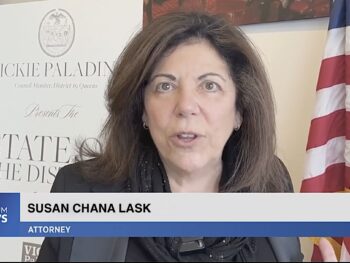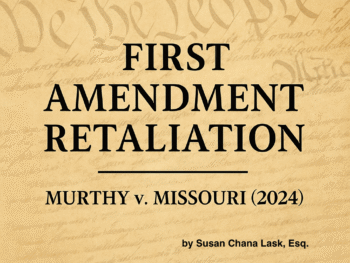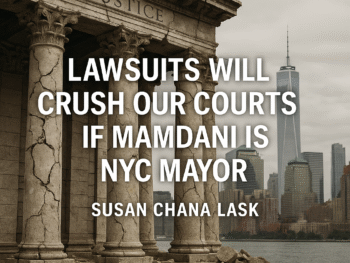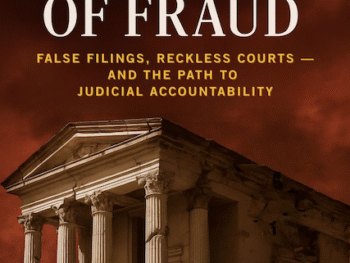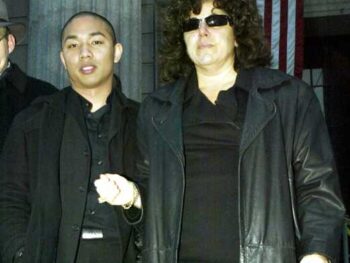US Supreme Court to decide the constitutionality of blanket strip-searches
By Jason Grant, The Star-Ledger, nj.com
Published: 04/25/2011

Attorney Susan Chana Lask and her client Albert Florence
discuss his case that the U.S. Supreme Court will hear regarding
unlimited strip searches.
NEWARK — Albert Florence stared in fear at the other inmates ahead of him being ordered to remove their clothes, squat down, force a cough and spread their body parts for inspection. A proud man, Florence was deathly afraid of being degraded when it was his turn to be strip-searched on that 2005 day in the Essex County jail.
“It was horrible,” Florence says today of the five-minute inspection he endured moments later. “I can even remember looking at a couple of the officers and one of them had a grin on his face. And then you look to the left or the right of you, and you know, it seems like another guy is looking at you, and it’s — it’s disgusting, very disgusting.”
That strip-search and, to a lesser extent, the strange and somewhat confounding circumstances that surrounded Florence’s six-day detention in 2005 have led to a potentially landmark civil rights case to be argued this fall before the U.S. Supreme Court.
Within months of leaving jail, Florence filed a civil rights lawsuit — one that for six years now has roiled emotions, sparked debate and fueled a pitched battle between fervent lawyers on each side — lawyers who respect each other professionally, but who couldn’t sound more outraged at the others’ arguments.
The case of Albert W. Florence against Essex and Burlington counties stands on a precipice: Emotionally, Florence, now 35, believes a hearing in front of the Supreme Court will help him to heal. Legally, the Supreme Court’s ruling is expected to set clear national law — and thereby affect tens of thousands of people for years to come — on an issue that has split the country’s federal appeals courts: Whether correctional facilities can strip-search a noncriminal offender without having a “reasonable suspicion” that the person might be concealing something.
It is an appellate case that Washington, D.C.-based Supreme Court litigator, Carter G. Phillips, who will argue before the court for Essex County, calls, “A classic pay-your-money-and-take-your-chances kind of case.”
On one hand, Essex and Burlington counties will argue that the Supreme Court should continue with its recent trend of giving more deference to correctional facility officials to run their houses as they see fit. Essex and Burlington will contend that safety is paramount and that anyone who enters the four walls of their facilities must be strip-searched, no matter the circumstances, in order to pinpoint gang members through spotting their tattoos, identify and prevent the spread of staph infections, and, most notably, prevent the smuggling in of weapons, drugs or other contraband.
On the other hand, attorneys for Florence will argue the Fourth Amendment of the U.S. Constitution, which protects citizens again unwarranted searches and seizures, calls for a different balancing of the rights of the government against the intrusion into one’s privacy. As Susan Chana Lask, the civil rights attorney who has handled Florence’s case for six years, said recently, “How reasonable does everyone think it is to get hauled off to jail for a traffic ticket and get strip-searched?”
Lask argues vehemently that what happened to Florence could “happen to anyone” and that those accused of being nonviolent offenders should be treated differently than murder suspects and more serious criminals. A proper balancing under the Fourth Amendment, Lask says, calls for correctional facilities to make a “reasonable suspicion” determination before strip-searching a low-level offender. Plus, Lask says, “there’s a practical fix, which is to physically separate the noncriminal offenders (in the correctional facilities) from the murderers and the rapists.”
Meanwhile, the stakes for Essex and Burlington counties are particularly high. While Florence at first brought his case individually, his lawsuit was later certified as a class action by the federal trial court, which ruled in Florence’s favor, finding his strip-searches to be unconstitutional. That means if Florence wins at the Supreme Court, the class of previously strip-searched noncriminal offenders at the Essex and Burlington jails — a group that has been estimated to be 10,000 people — can ask for thousands of dollars in damages.
THE TRAFFIC STOP
On March 3, 2005, a state police officer in Burlington County pulled over Florence’s wife, April, for driving 82 mph in a 65-mph zone. The police officer ran the vehicle’s registration and arrested Albert Florence, the passenger, after learning that there was an Essex County warrant for his arrest, according to court records and state police spokesman Stephen Jones.
Suddenly, Florence was on his way to the Burlington County Correctional Facility, even though he quickly gave officials a piece of paper that bore “a raised seal from the State of New Jersey” and showed “that all judgments against plaintiff were satisfied and no warrant existed against him,” according to his lawsuit.
Indeed, the warrant for Florence had been dismissed in 2003, court filings show and the lawyers in the case say.
It’s unclear why it remained active in authorities’ computer databases, officials say.
Once incarcerated, Florence — who today lives in Bordentown, with April and four young sons — spent five to six days in Burlington as a “holdover” inmate, waiting to be transferred to Essex County. At a sparsely attended news conference organized earlier this month by Lask, Florence described the first strip-search he endured — the one done in Burlington — as a “horrible moment.” He was ordered to “while nude, open his mouth, lift his tongue, hold his arms out, turn fully around, and lift his genitals,” said his lawsuit complaint.
At the same news conference, Florence explained that as the days behind bars mounted, he began to worry deeply about whether the life he’d built in 2005 — a new marriage, a new house and a child on the way — was suddenly “crashing down.” To top it off, he said, he was eventually transferred to the Essex County Correctional Facility, where he said he suffered an even worse strip-search than the one in Burlington.
“You’re in there with convicted felons, murderers, carjackers, every walk of life,” he said about his time in the Essex County facility, “and everybody’s laughing … and here I am sitting there wondering if my life is over: financially, emotionally, my personal life, if that’s over.”
Florence only stayed a day in Essex County before he saw a magistrate judge who quickly released him based on the warrant having been dismissed.
At the trial level, one issue hotly contested before U.S. District Court Judge Joseph H. Rodriguez was whether Florence was, in fact, strip-searched — or instead was only subjected to “clothing exchanges” linked to mandatory inmate showers. Several prison officers testified that they didn’t consider Florence’s treatment to be a strip-search, said J. Brooks DiDonato, a veteran lawyer who is defending Burlington County. But Judge Rodriguez disagreed.
Today, Florence – a six-foot-three, athletic-looking man with chiseled facial features and piercing dark eyes — is a finance manager at a car dealership in Middlesex County. He has spent most of his life in New Jersey and attended Essex County College, but did not finish. In his 2005 lawsuit brought against both Burlington and Essex — which includes other claims such as unlawful arrest and false imprisonment — he is seeking $1 million in compensatory damages, $1 million in exemplary damages and reimbursement for attorneys’ fees, among other requested relief.
IN THE BEGINNING
Many published reports over the years describing Florence’s case have referred to the warrant for Florence’s arrest in 2005 as coming from either an “unpaid traffic fine” or “unpaid fine.”
But those reports have not explained the circumstances underlying the fine.
According to court and police records, and a Burlington County filing in his lawsuit, Florence had a serious confrontation with the law in 1997. Documents obtained by The Star-Ledger from the Maplewood Police Department, and interviews with a Maplewood official, reveal that on Dec. 18, 1997, Florence was arrested and accused of speeding off from a traffic stop in a 1994 Honda Accord “that was used as a weapon to attempt to injure” a Maplewood police officer.
Court filings and police reports show that Florence was charged with criminal offenses including aggravated assault, obstruction of the administration of law, eluding/failure to stop, and possession of a weapon (the Honda Accord) for unlawful purpose.
A Burlington County court filing also says that, on or about May 4, 1998, Florence in turn pleaded guilty to the lesser indictable offenses of hindering prosecution and obstruction of the administration of law. He served probation after the plea, according to the court filing, and he may have been ordered to pay fines.
The Burlington legal brief says that on April 25, 2003, an arrest warrant was issued on the hindering-prosecution charge, but four days later, Florence satisfied the requirement of his probation and the warrant was dismissed.
Reached by telephone recently, a woman at Florence’s residence said he would not come to the phone to discuss his lawsuit, and she referred a reporter to Lask.
Lask said, “There was no aggravated assault” and said “the warrant in this case was for failure to pay a fine, which is not a crime, and it turned out the warrant was false anyhow.”
‘REASONABLE SUSPICION’
The Supreme Court issue arising from Florence’s lawsuit is one that appeared settled for many years under a 1979 decision called Bell v. Wolfish. Then-Associate Justice William Rehnquist wrote in Bell that a visual body-cavity search of a detained person was warranted after the inmate had contact with an outside visitor, regardless of why the person was incarcerated.
After Bell was decided, 10 U.S. appeals courts interpreted Bell to mean that a correctional facility could not strip-search a person brought in on minor offenses, unless the facility had a “reasonable suspicion” that the person was concealing something.
Since 2008, though, at least three U.S. appeals courts have now disagreed with that view of Bell, including the 3rd Circuit Court of Appeals in Philadelphia, which last year heard Florence’s case and decided that a correctional facility had a powerful interest in keeping its premises free of weapons and drugs. The court ruled that all people introduced to the general population of a facility can be strip-searched.
Writing for the majority, Judge Thomas M. Hardiman said that a blanket strip-search policy had an important “deterrent affect.” He added, “It is plausible that incarcerated persons will induce or recruit others to subject themselves to arrest on non-indictable offenses to smuggle weapons or other contraband into the facility.”
Jonathan Turley, a well-known George Washington University constitutional law professor, said the court’s argument about people getting arrested for low-level offenses and smuggling in contraband for others struck him as particularly “fanciful.” He also said the “small percentage” of inmates who “actually introduce contraband” by hiding it in their bodies means that “claims of imminent threats aren’t supported by the data.”
But the Burlington lawyer, DiDonato, said people smuggling contraband in their bodies into jails is “a far more commonplace incident than most people could imagine.” He sees safety in prisons as paramount. “If I were admitted to the general population of a facility for an offense like an unpaid fine, I would be want to be sure that the people I was sharing a cell with had been strip-searched — whether I was rightfully or wrongfully incarcerated,” he said.
Phillips, the Supreme Court litigator for Essex County, who has argued more cases before the high court than any other private practitioner alive, contends that physically separating the noncriminal offenders in facilities from those accused of serious crimes “would be an administrative nightmare for most places” and could mean “doubling the costs.”
“If I’m walking in there for a broken taillight, I don’t expect to get strip-searched,” argued Susan Chana Lask, Florence’s attorney, who offered to take on the case without charging her client any legal fees.
The Supreme Court is expected to hear the case later this fall.
For Florence, the looming decision is more personal. Asked at the recent news conference, held the day after the Supreme Court agreed to hear his case, whether he had ever gotten psychological counseling for the strip-search trauma he suffered, he said no.
Then he said, “The counseling part is being able to sit in front of you guys today, and saying you know, this case will get heard and will be heard by the highest court in the land. That’s surreal. It’s an incredible journey that we’ve been on, and I’m looking for justice.”
Vinessa Erminio contributed to this report.

